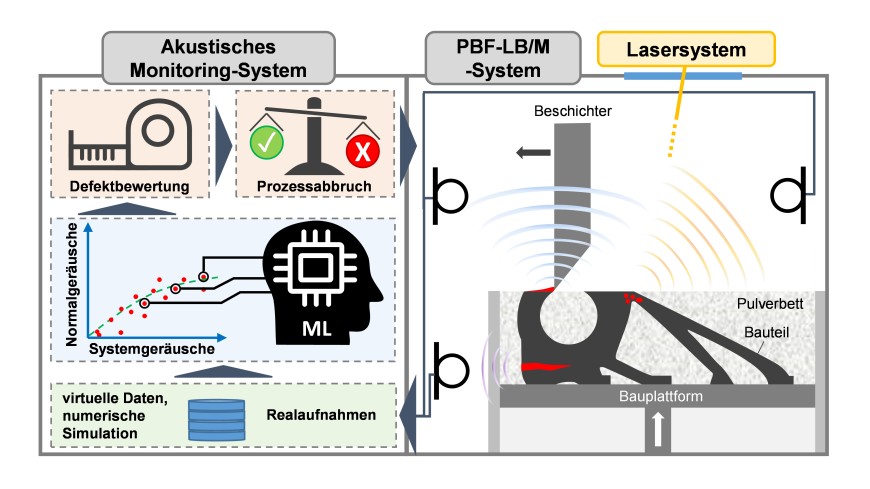Coordination: Peter Gross M.Sc.
Duration: 01.11.2021 – 31.10.2024
Funded by: Federal Ministry for Economic Affairs and Climate Action
Motivation
Additive manufacturing processes, such as powder bed fusion with a laser beam on metal (PBF-LB/M), can create complex structures directly and close to the final geometry. PBF hardly restricts component design and is therefore predestined for lightweight construction. As the complex melting and solidification mechanisms in PBF are currently only partially mastered, resulting in defects such as porosity, the lightweight construction potential can only be exploited to a very limited extent. In particular, strong cross-sectional changes or overhanging structures favor defects such as pores, cracks, distortion and material bulges, which do not meet the quality requirements of the aerospace industry, for example. This results in rejects, i.e. resources are wasted. This unnecessary consumption of resources and the underutilized lightweight construction potential increase greenhouse gas emissions indirectly (waste of material and energy due to faulty components) or directly (underutilized lightweight construction potential of the components to be manufactured). Existing systems for quality assurance by means of process monitoring in PBF use optical sensors that detect the radiation emitted by the molten bath. However, smoke formation and the temperature and wavelength dependence of the radiation intensity distort the measurement signals. In most cases, a machine operator decides whether to stop the process, which means that quality monitoring has not yet been automated. In contrast, acoustic quality monitoring is a promising approach. Experienced production employees can hear deviations from the “normal noise” of a production system and thus draw conclusions about the process or product quality. This noise evaluation is purely subjective but allows conclusions to be drawn about the condition of machines and is therefore crucial for product quality and the value chain. The requirements with regard to quality and therefore process monitoring in the aerospace industry, for example, go far beyond this subjective assessment. The use of process monitoring systems can also generate deeper levels of process understanding (e.g. quantified correlations between process anomalies and resulting defects).
Objectives
The aim of the project is to automatically evaluate noise and thus monitor the quality of PBF, particularly in lightweight construction. Based on sound data, machine learning (ML) algorithms recognize previously learned error patterns or deviations of the system noises from “normal noises” of the PBF process.
The noises are mapped in a data model including the relevant process variables (e.g. control commands and machine parameters). ML algorithms correlate acoustic changes in the “normal noise” with deviations in the process variables. The sounds of the data model (virtual sound data) supplement measured sound data. ML algorithms must be trained with a sufficient number of fault patterns, which are often not available in practice because measuring all fault patterns is too time-consuming. This project overcomes this practical hurdle of ML by using virtual sound data and also addresses questions about the robustness of ML algorithms. Another advantage of using virtual data could be to minimize risks when considering data worthy of protection, as the storage time of real data is minimized and error classification can already take place at the network edge as soon as it is possible to train ML algorithms with virtual data. Software based on robust ML algorithms digitizes quality monitoring in lightweight production using PBF as an element of artificial intelligence (AI). The project will implement a PBF pilot plant that demonstrates the real use of acoustic quality monitoring as a prototype.
Approaches
As part of this project, PTW aims to gain a deeper and more comprehensive understanding of the PBF process in order to better exploit the potential of additive manufacturing and improve the process in terms of resource efficiency. The initial focus is on the production and metrological evaluation of components and the defects they contain, as well as the in-process data recording using acoustic process monitoring systems. In addition to classifying the type of defect, a characterization of the defect properties (e.g. size, shape) is also carried out. These annotated data sets then serve as input variables for the ML models to train the algorithms and are therefore fundamental. The final step involves a comparison between acoustic and optical process monitoring and an evaluation of the monitoring quality. The results achieved are implemented in a demonstrator and thus stabilized in the long term.
Acknowledgement
The ML-S-LeAF research and development project is funded by the German Federal Ministry for Economic Affairs and Climate Action (BMWK). We would like to thank you for the opportunity to work on this project.
Funding source
Consortium partners
Project sponsors



